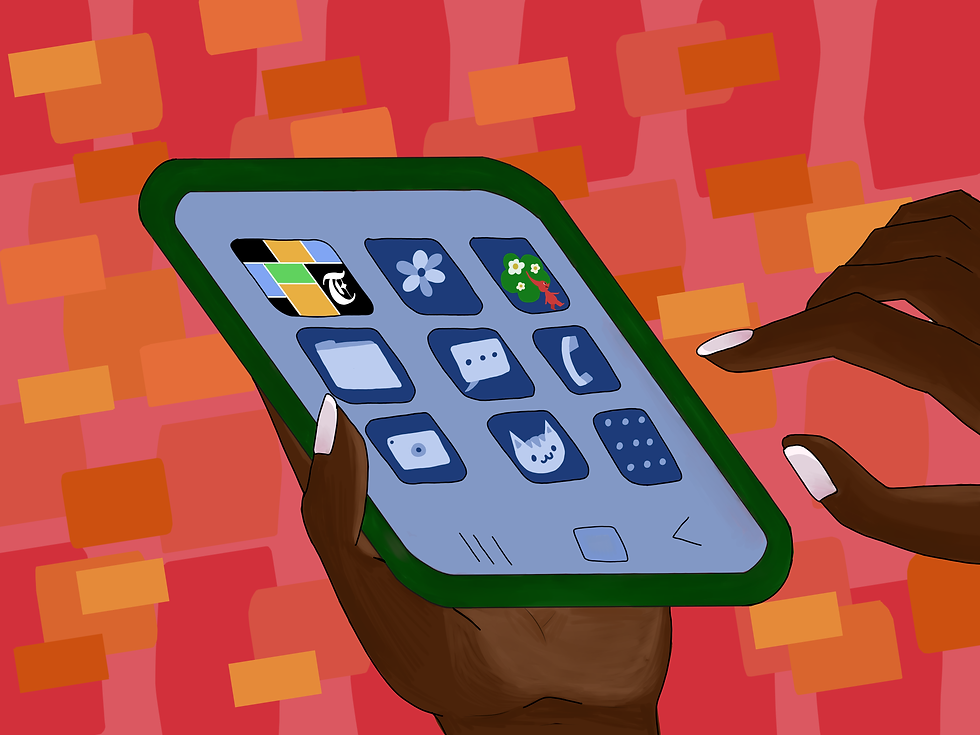Roses are red, violets are blue, make this Valentine’s Day all about you
- Ankita Mandal
- Feb 14, 2025
- 4 min read
Updated: Feb 15, 2025
Whether you’re in a relationship, planning Galentine’s, or exploring that connection you can’t tell your friends about, this Valentine’s Day is BYOV: Be Your Own Valentine.

Photography by Ming Yuan/The Barnard Bulletin
February 14, 2025
Along with the prettiest snowstorms and the not-so-pretty seasonal flu, love is officially in the air! Valentine’s Day has made its grand entrance, dressing the streets of Morningside Heights in shades of pink and chocolate, filling bakery cases with heart-shaped treats, and turning every corner bodega into a last-minute florist. It’s a day that doesn’t just celebrate love — it embraces it, from the carefully chosen dinner reservations where all we have to do is dress up to the handwritten notes slipped into our cozy puffer pockets. Whether that love is romantic, platonic, or an excuse to splurge on overpriced truffles, the day is a reminder that love — when done right — should feel like something worth celebrating. Because whether you’re all in, newly cuffed, or still entertaining a “wyd” text from that someone you met that one time, there’s one thing that matters most: are you being loved the way you deserve?
Valentine’s Day has a way of making relationships feel like performances — carefully curated Instagram stories, well-timed gifts, and captions that say "my person" even when the reality is a little less perfect. But love, in its healthiest form, is not about grand gestures — it’s about how you feel when the 24-hour stories expire, when the gifts are tucked away, when the holiday decorations come down.
Dr. Alexandra Solomon, a clinical psychologist at The Family Institute at Northwestern University and relationship expert, explains how true intimacy isn’t made up by a single moment — instead, it’s the cultivation of small, consistent actions of partners showing up for each other. In other words, love isn’t just the bouquet you get on February 14 — it’s who texts you first before your 8:40 a.m. class on Monday just to check in. It’s who remembers that you like your coffee light on the oat milk but extra foamy. It’s the person who shows up when it’s inconvenient, who makes being you easier, not more complicated.
College life is not easy. There is limited time to do laundry and figure out plans, pick up food with the ones you love, or even take a break from studying. If your partner is not the one offering to help carry your laundry up to the eighth floor of Sulzberger, picking up a s’mores Pop-Tart from JJ’s after your long day, or reminding you that you are incredible while your 40-page reading is due tomorrow just because, then what exactly are you doing? Because the right type of love does happen here, and that’s the way it should be — love should feel like home, like someone who loves you the way you love you.That’s where the relationship that can truly be called the love of your life begins — the relationship with yourself.
Feelings aside, loving yourself isn’t just a buzzword — it’s a neurological necessity. Dr. Tara Well, a Barnard psychology professor, specializes in self-reflection and emotional resilience. She explains that self-compassion — which you can find in yourself through reflective acts like journaling, meditation, or simply speaking to yourself with kindness — can significantly lower stress levels and improve overall mental clarity.
Neuroscience studies show that when people engage in self-love practices, their brains release oxytocin, our very own "feel-good" hormone, and lower cortisol, the opposite and our stress hormone. This practice improves mood, strengthens immune function, promotes better sleep, and even enhances cardiovascular health. Meanwhile, chronic stress — the kind associated with waiting for a text back, feeling unseen in a relationship, or putting your own needs last — does the opposite. It weakens the immune system, disrupts cognitive function, and fuels anxiety.
So, in short, prioritizing yourself isn’t just an emotional power move — it’s preventative healthcare.
If there is any place that recognizes the power of self-sufficiency, it is Barnard. Here, people don’t wait around for someone else to make their life exciting — they take themselves on museum dates, turn study sessions into coffee shop rituals, and curate their own joy. Whether it is celebrating Valentine’s Day with a best friend, a partner, or just a really good meal alone, Barnard students set the standard for how they want to be treated.
That brings us to what Barnard is up to for Valentine’s Day this year. Some of us are going on surprise dates with partners, some of us are setting up Galentine’s with our friends, and some of us are declaring our love for JJ’s mozzarella sticks. One Barnard first-year simply said, “I think I’ll spend my day in Milstein, get a poke bowl, and go to Amity at night.” Love comes in many forms, and sometimes, the best way to celebrate is to just do whatever makes you happiest.
If you are single, make February 14 a celebration. Plan the kind of date you’ve always dreamt of. Romanticize your night — watch “Pride and Prejudice” for the tenth time, throw a party with your friends, or buy yourself fancy chocolate just because you can.
If you are in a relationship, make it a celebration. Take them to that one place you love, and let them take you to theirs. But also, take a quick moment to check in: do you feel loved every day, or just on February 14? If the flowers and the dinner reservation are covering up a relationship where you feel unseen, unheard, or undervalued, it might be time to ask yourself some bigger questions.
Valentine’s Day is one day. But the way you treat yourself? That’s a love story that lasts a lifetime.




